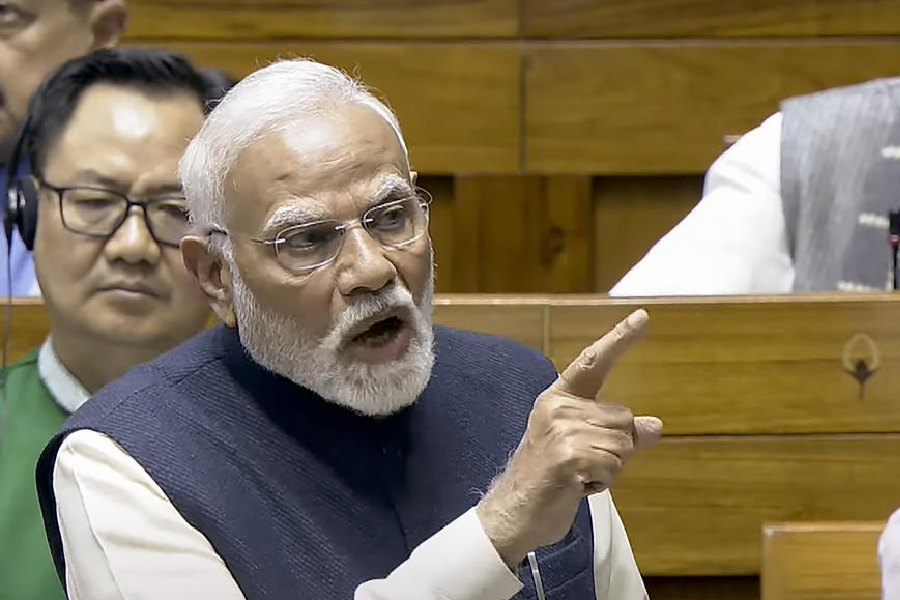NEW DELHI, Dec 14: On Saturday, Prime Minister Narendra Modi stated that the Congress party, having “tasted blood,” has repeatedly harmed the Constitution. He emphasized that his government’s policies, since taking office in 2014, have been focused on strengthening India and promoting its unity in alignment with the constitutional vision.
During a two-day debate in the Lok Sabha marking the 75th anniversary of the Constitution’s adoption, Modi criticized previous Congress governments for sowing “poisonous” seeds within the country’s diversity, exacerbating its divisions and undermining its unity.
In a pointed critique of the Nehru-Gandhi family, he claimed they spared no effort in undermining the Constitution.
“This family has challenged the Constitution at every level,” he declared, pointing out their extended tenure in power for 55 years.
Having “tasted blood,” this family has repeatedly assaulted the Constitution, he noted, referencing various decisions made by former Prime Ministers Jawaharlal Nehru, Indira Gandhi, and Rajiv Gandhi.
He remarked that the next generation is continuing this trend, taking a jab at Rahul Gandhi and Priyanka Gandhi Vadra.
Modi asserted that leaders like himself and others from humble backgrounds could not have risen to their positions without the strength provided by the Constitution, reiterating his commitment to its values.
As the chief minister of Gujarat, he recalled celebrating the 60th anniversary of the Constitution’s adoption by placing a copy of the document on an elephant and walking barefoot beneath it, symbolizing its importance.
He criticized the Nehru-Gandhi family further, stating that Jawaharlal Nehru amended the Constitution to limit freedom of expression, while his daughter Indira Gandhi declared a state of Emergency to bypass a Supreme Court ruling that invalidated her election as an MP.
She “stifled India’s democracy and distorted the Constitution” as its 25th anniversary approached, to protect her position as Prime Minister, he noted, highlighting her amendment that shielded the president, vice president, and herself from legal challenges retroactively.
According to Modi, the nation was effectively turned into a prison and the judiciary faced suppression during that time, and Rajiv Gandhi, who succeeded his mother, also amended the Constitution.
“This stain on the Congress cannot be erased,” Modi asserted.
Without directly naming Rahul Gandhi, he referred to an “arrogant” individual who tore up a Cabinet decision when the Congress-led UPA government, headed by then-Prime Minister Manmohan Singh, was in power.
He added that during the UPA regime, the National Advisory Council, led by Sonia Gandhi, was positioned as “superior” to the Cabinet.
While the framers of the Constitution deliberately decided against reservations based on religion to uphold national unity and integrity, Modi accused Congress of compromising this principle out of “greed for power” to cater to its vote bank.
His government, he noted, repealed Article 370 to foster national unity and introduced GST to create a “one nation, one tax” system.
Modi proclaimed India’s journey since the Constitution’s adoption in 1949 as “extraordinary,” asserting that the country’s ancient democratic heritage has long served as an inspiration globally.
He stated that India is not only a large democracy but also the mother of democracy, responding to the Lok Sabha debate concerning the Constitution’s 75-year milestone.
Modi declared India’s ambition to become a developed nation by 2047, emphasizing that unity is crucial to achieving this objective. “Our Constitution is the foundation of our unity,” he asserted.
He reiterated that India defied initial doubts regarding its democratic trajectory post-independence, crediting the Constitution for the nation’s progress.
Modi expressed gratitude to the architects of the Constitution and the citizens for adhering to its principles.
Those involved in drafting the Constitution recognized that India did not emerge as a democracy in 1947 or 1950, citing comments from notable figures such as Purushottam Das Tandon and Bhim Rao Ambedkar.
He highlighted that women were granted voting rights through the Constitution and pointed out that the nation is presently witnessing women-led development.
He praised parliament members for their unanimous approval of the law granting reservations to women in the Lok Sabha and state assemblies.


Leave a Reply